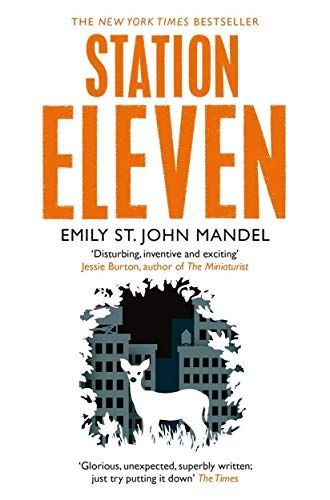
Station Eleven
DAY ONE The Georgia Flu explodes over the surface of the earth like a neutron bomb. News reports put the mortality rate at over 99%. WEEK TWO Civilization has crumbled. YEAR TWENTY A band of actors and musicians called the Travelling Symphony move through their territories performing concerts and Shakespeare to the settlements that have grown up there. Twenty years after the pandemic, life feels relatively safe. But now a new danger looms, and he threatens the hopeful world every survivor has tried to rebuild. STATION ELEVEN Moving backwards and forwards in time, from the glittering years just before the collapse to the strange and altered world that exists twenty years after, Station Eleven charts the unexpected twists of fate that connect six people: famous actor Arthur Leander; Jeevan - warned about the flu just in time; Arthur's first wife Miranda; Arthur's oldest friend Clark; Kirsten, a young actress with the Travelling Symphony; and the mysterious and self-proclaimed 'prophet'. Thrilling, unique and deeply moving, this is a beautiful novel that asks questions about art and fame and about the relationships that sustain us through anything - even the end of the world.
Reviews
Nate@wiredfractal
André Nóbrega@anobrega85
ni@poetics
Beth Bartholomew@BooksNest
Jennifer Palmer@mompalm
Zachary Roberts@zachsports22
Gemma@gem27
Aims@aimz
Daisy Marmion@daisysunshine
Flora Ossenfort@floraossen
Harlee K@harleemai
Des@mechaderay
Amanda @asteil
Rae@raeraerae
✧༺♥༻✧@lilbeanstalk
Aeryn Emmerich-Wise@alemmwise
Sohini Roy@sohiniroy121
lala@polijus
Grace Edwards@graceedwards
Claire Jorgensen@clairejorgie
elizabeth@ekmclaren
amira@itamakis
Avery@schmavery
Joe@joe2267
Highlights
Zachary Roberts@zachsports22
Page 178
Gemma@gem27
Page 249
Jamie Griffin@jag
Uyirmei@uyirmei
Uyirmei@uyirmei
Uyirmei@uyirmei
Uyirmei@uyirmei
Uyirmei@uyirmei
Emiley Jones@emileyjones
Emiley Jones@emileyjones
Emiley Jones@emileyjones
Emiley Jones@emileyjones
Emiley Jones@emileyjones
Page 318
Laura Wilson@bookswithlaura
Natalie Unsinn @natalieunsinn
Page 163
Naomi J.@naomij
Naomi J.@naomij
casey@edgerunner
casey@edgerunner
Dylan Williams@dsw-williams